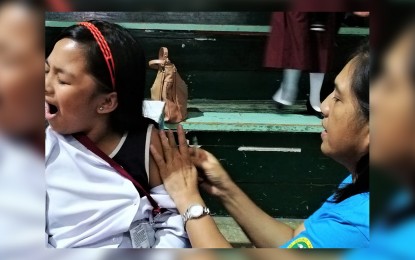
SCHOOL-BASED IMMUNIZATION. Around 1,000 Grade 7 students of Baguio City National High School have been allowed by their parents to get anti-measles and the anti-tetanus and diphtheria shots in Tuesday’s launch of the school-based immunization program. They are part of the 61,000 students in the Cordillera targeted to be vaccinated. (PNA photo by Liza T. Agoot)
BAGUIO CITY-- The Department of Health-Cordillera Administrative Region (DOH-CAR) targets to immunize 61,765 learners from Kindergarten to Grade 7 against tetanus, diphtheria, and measles, as part of the government's school-based immunization program, an official said Tuesday.
“The school-based immunization program was started in 2013 and the continuing activity hopes to give vaccines to 61,765 learners from Kinder to Grade 7 in the six provinces and two cities in the region,” said Dr. Anachris Kilaan, family health cluster head of the DOH-CAR in a press conference following the launching of the program.
Children belonging to Grades 1 and 7 will receive anti-tetanus and anti diphtheria vaccines while those in Kindergarten, Grades 2, 3, 4, 5 and 6 will receive the anti-measles vaccines.
Kilaan said they will be distributing forms, which contain questions such as the immunization history of a child, for parents and guardians to fill-out.
“If they have not had at least two measles, tetanus-diphtheria, and HPV (human papillomavirus) vaccines in the past, they can be given a booster shot,” she said.
The booster shot will improve their immunity as it has been noted that as people mature, their immunity from acquiring certain illnesses also decreases.
Kilaan said in the first semester of the year, the DOH did the outbreak immunization response where measles vaccines were given to children aged six to 59 months as a preventive measure.
A total of 74,740 children within the target age were reached out of the total 79,002 targets.
Measles booster shots were also given to 17,889 with 11,135 of them belonging to the five to 12 years age group.
“This was given to those found to have not received the vaccine when they were young,” Kilaan said.
Kilaan said they continue to advocate and inform parents of the benefits of giving the vaccine to prevent children from getting sick of vaccine-preventable illnesses.
“The vulnerability of the parents to fake news about vaccination is due to their lack of knowledge and that is what we are trying to address, to make them allow their children to be given vaccines, and eventually protect them from possible risks,” Kilaan said.
“We want to reach more people, even the adults as they too can still receive booster shots if they have not received as a child more than one vaccine or if they cannot remember whether they received it,” she said.
Boosting rate of immunization coverage
At the Baguio City National High School where the program was launched, around 1,000 Grade 7 students were allowed by their parents to receive the immunization. This is about 60 percent of the total in the grade level.
Among the reasons of the parents of the 40 percent who refused to have their children immunized were the Dengvaxia scare while some said they have already received their vaccines from private providers. Some reasoned out religious prohibition.
Dr. Elvira Belingon from the Baguio Health Services Office (HSO) said they are targeting around 14,000 students from Kindergarten to Grade 7 in Baguio under the school-based immunization.
Brenda Cariño, principal of the BCNHS said the parents were informed of the school-based immunization during the assembly held on July 20, where doctors gave a briefing of the health benefits of immunization.
Based on DOH-CAR record on full immunization coverage (FIC), the region recorded 61.27 percent coverage in 2018 lower than the 95 percent target.
A child considered to be within the FIC category is one who received a dose of Bacillus Calmette–Guérin vaccine and Hepatitis B at birth; three doses of DPT/Pentavalent within the 6th, 10th and 14th weeks in the life of a child and one dose of the measles vaccine at nine months.
In 2011, the coverage for FIC was 75.64 percent; in 2012 it was 71.55 percent; 73.57 percent in 2013; 72.45 percent in 2014; 67.42 percent in 2016; and 60.82 percent in 2017.
According to the Disease surveillance report from January 1 to July 27, there are 899 measles suspect recorded in the region. This is a 425 percent increase with four deaths.
From the 899 cases, 59 percent belong to the category “not immunized” or “cannot remember if immunized”
There are 224 laboratory-confirmed measles cases and 54 percent of them are not vaccinated with anti-measles. (PNA)
